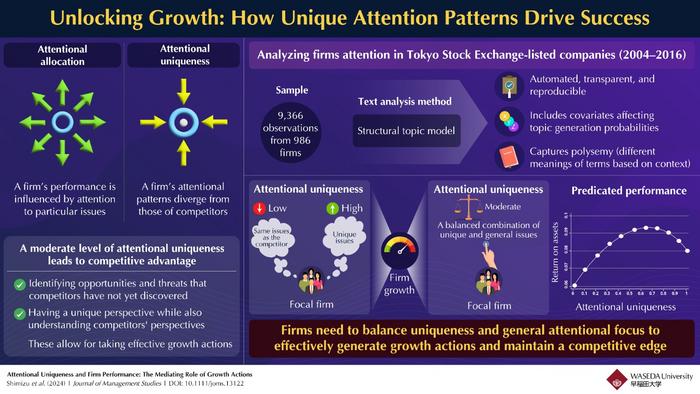According to the attention-based view, a firm’s actions and growth performance are directly influenced by its attentional allocation to specific issues. The consequences of organizational attention are reflected in the firm’s strategic decision-making and adaptability. However, existing literature is limited in its exploration of how a firm’s attentional uniqueness impacts its behavior and performance. Notably, attentional uniqueness refers to how the firm’s attentional allocation diverges from competitors in the same industry.

Credit: Junichi Yamanoi from Waseda University
According to the attention-based view, a firm’s actions and growth performance are directly influenced by its attentional allocation to specific issues. The consequences of organizational attention are reflected in the firm’s strategic decision-making and adaptability. However, existing literature is limited in its exploration of how a firm’s attentional uniqueness impacts its behavior and performance. Notably, attentional uniqueness refers to how the firm’s attentional allocation diverges from competitors in the same industry.
To address the above-mentioned knowledge gap, Associate Professor Takumi Shimizu of Keio University led a study that examined the relationship between attentional uniqueness and firm performance, mediated by the frequency of growth actions. It was co-authored by Associate Professor Junichi Yamanoi and Associate Professor Susumu Nagayama from Waseda University and Hitotsubashi University, respectively, and published in the Journal of Management Studies on 23 June 2024.
Yamanoi remarks, “We observed variations in the issues that different firms focus on and were interested in exploring the behavioral and performance consequences of these differences.”
Using the structural topic model, an unsupervised machine learning technique in natural language processing, the researchers examined publicly listed companies on the Tokyo Stock Exchange from 2004 to 2016 as their sample. A total of 9,366 observations were finalized from 986 firms. The data collection process involved extracting raw text and focusing on strategic agendas and managerial issues outlined in the reports.
After thorough analysis, the researchers discovered an inverted U-shaped relationship between attentional uniqueness and firm performance, indicating that firms achieve optimal performance with a balanced level of attentional uniqueness. Both too much and too little divergence in focus can be detrimental to performance. Additionally, the frequency of growth actions, which are initiatives aimed at capitalizing on opportunities, plays a mediating role in this relationship. This inverted U-shaped relationship is further pronounced in environments with scarce opportunities, demonstrating that a moderately unique attentional focus is required in the absence of market opportunities.
The researchers illustrate how organizational attention can drive growth actions with the example of Toyota’s development of the Prius. In 1993, Eiji Toyoda, then-chairman of Toyota, questioned the sustainability of current trends and emerging challenges in the automobile industry, leading to the formation of a project committee. This committee identified ‘resources’ and ‘environment’ as crucial issues for future vehicles. By 1997, Toyota introduced the Prius, a gasoline-electric hybrid designed to address these environmental challenges, significantly improving fuel efficiency and reducing air pollution. While Toyota focused on these forward-looking issues, competitors like General Motors remained fixated on traditional concerns such as model variety, design, and conventional engine performance. Consequently, they were slow to respond to the innovative launch of the Prius.
Yamanoi emphasizes, “We propose practical implications for managers aiming to pursue firm growth through proactive actions. Managers are encouraged to direct their focus towards issues that are relatively distinct from those of their competitors.”
The findings of the present study indicate that, while monitoring competitors often focus on tangible aspects, such as market positioning or strategic initiatives, it is crucial to also pay attention to how competitors allocate their attention and the underlying assumptions they make about managerial issues. This approach is particularly pertinent for managers operating in mature industries, where growth opportunities are scarce. Recognizing the importance of attentional uniqueness can empower a firm to identify and seize growth opportunities that might otherwise go unnoticed. By understanding and acting upon unique insights, firms can initiate growth actions that capitalize on these opportunities.
Overall, this study marks a notable advancement in our understanding of the strategic importance of attentional uniqueness. It highlights the nuanced ways in which firms can harness their unique perspectives to drive performance and achieve lasting success.
***
Reference
DOI: 10.1111/joms.13122
Authors: Takumi Shimizua, Susumu Nagayamab, and Junichi Yamanoic
Affiliations
aKeio University
bHitotsubashi University
cWaseda University
About Waseda University
Located in the heart of Tokyo, Waseda University is a leading private research university that has long been dedicated to academic excellence, innovative research, and civic engagement at both the local and global levels since 1882. The University has produced many changemakers in its history, including nine prime ministers and many leaders in business, science and technology, literature, sports, and film. Waseda has strong collaborations with overseas research institutions and is committed to advancing cutting-edge research and developing leaders who can contribute to the resolution of complex, global social issues. The University has set a target of achieving a zero-carbon campus by 2032, in line with the Sustainable Development Goals (SDGs) adopted by the United Nations in 2015.
To learn more about Waseda University, visit
About Associate Professor Junichi Yamanoi
Junichi Yamanoi is an Associate Professor at the School of Commerce, Waseda University, Japan. He received a Ph.D. in Business Administration from the University of Connecticut, USA. His research focuses on strategic management, including diverse topics such as managerial psychological characteristics, the interplay of competition and cooperation, mergers and acquisitions, foreign direct investment, and family firms.
Journal
Journal of Management Studies
Method of Research
Observational study
Subject of Research
Not applicable
Article Title
Attentional Uniqueness and Firm Performance: The Mediating Role of Growth Actions
Article Publication Date
23-Jun-2024



